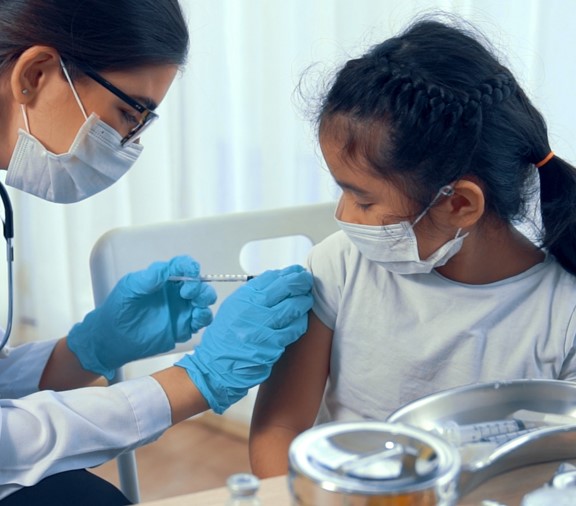
What Parents Should Know About Childhood Vaccines
September 16, 2022
The best way to treat childhood illnesses is to prevent them. Vaccines, also called vaccinations, were created to protect people of all ages from serious illnesses and diseases.
When you take your baby, toddler, young child, and teenager to the doctor for their vaccines, you help them to stay as healthy as possible.
To learn what vaccines are, how they work, and more, keep reading!
North Texas pediatric physician assistant Patrick Tarango explains the basics of vaccines and why they are so important.
What is a vaccine?
A vaccine is a type of medicine that your child takes before they get sick. After getting the vaccination, your child’s body will learn how to resist the disease in the future.
Vaccines can be administered by:
- Injection (vaccination shot)
- Orally (by mouth)
- Nasal spray (into the nose)
How do vaccines work?
Vaccines include tiny amounts of weak viruses or bacteria—the same type that can cause an illness. Once the vaccine is inside your child’s body, it makes a plan to fight the illness.
If your child is exposed to that virus or bacteria in the future, their body will remember how to fight it.
Can my child get sick from the vaccine?
No. Your child cannot get the illness or disease from the vaccine. The virus or bacteria in the vaccine are too weak.
The amount in the vaccine is very small, just enough for your child’s body to use for “practice.”
Learn more from pediatric physician assistant Patrick Tarango in this brief video below.
What diseases do vaccines prevent?
Germs are everywhere. When our bodies cannot fight them off, germs lead to infections, illnesses, and disease.
Some of these can be deadly—which is why getting your child vaccinated on schedule is so important.
Vaccines protect against life-threatening illnesses, such as:
- Cervical cancer
- COVID-19
- Diphtheria
- Hepatitis B
- Influenza
- Pneumonia
- Polio
- Rabies
- And more!
Many deadly diseases can spread from one person to another. That means vaccines allow you to protect yourself, your children, and everyone around you.
In this video, Patrick Tarango shares the ways vaccines support good health for the whole family.
Are vaccines safe for everyone?
Almost everyone can get vaccinated without risk to their health. However, there are a few people who should not get vaccines.
Children should not get certain vaccines if they:
- Have a chronic illness
- Are taking medication that weaken their immune system
- Are allergic to vaccine ingredients
If your child is in daycare or school, they might be required to have certain vaccinations before attending. If you have concerns or questions about vaccinations, be sure to talk to your child’s doctor.
Patrick Tarango offers additional tips for parents in this final video.
Do you need insurance for yourself and your children?
Texas STAR (Medicaid) and Texas CHIP provide healthcare for low-income families, children, and pregnant women at low or no cost.
Already a Parkland Community Health Plan member?
Visit our Member Portal to search for doctors near you.


